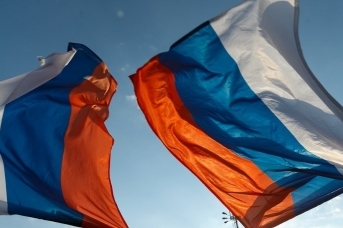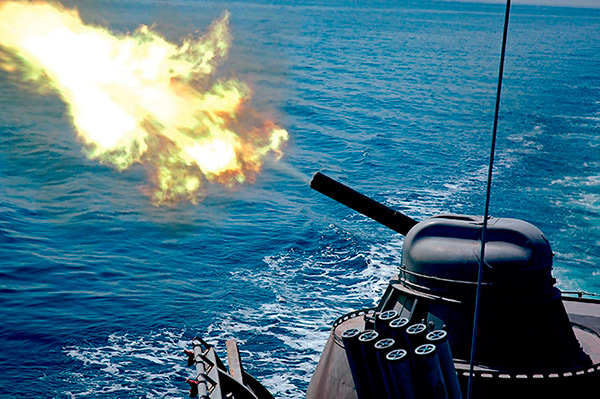
State corporations are also criticized by the Communists., but from different positions. However, liberals, and the communists agree on the assessment of state corporations in that, what is a monopoly, and therefore - bad. For liberals - because there is no competition, and for the Communists - because there are no barriers to the over-exploitation of labor.
However, state-owned corporations have one more aspect - they were conceived as an institution of the struggle for the sovereignty of Russia, forming state monopoly capital. They are easier to control for the state., and supposedly it optimizes the achievement of his goals.
Naturally, that state corporations operate in the form of joint stock companies, and if so, then there are all the attributes of capitalism: stocks, their exchange rate, and, Consequently, dependence on equity investment of all, who has free money.
State corporations, conceived as a means of sovereignization of strategic industries, hit Wednesday, where success (stock price) depends on rating, and corporate rating depends on the country's investment rating, which defines the IMF. And since Russian state corporations have a very large share of foreign shareholders in the form of various investment funds, then there is the possibility of lending in dollars from foreign banks.
Here that trap arises, which turns state corporations into weapons, the control of which the enemy seeks to intercept, although formally it is in the hands of the state. Russian state corporations have a very large corporate debt in dollars.
These are loans secured by shares., and loan terms are directly linked to the country's rating. This rating acts as a lever: the higher it is, the more favorable the loan. And as the rating of the country decreases, the rating of corporations decreases. This means, Increase in collateral is required and available loan amount decreases.
Access to this feeder is possible only if, if the state joins the IMF, accepting its charter. And the IMF is created by the US Federal Reserve, and his task is to help the dollar, not other currencies. It is the IMF Charter that forbids Russia as a state to limit currency speculators, playing against the ruble and creating permanent deflation in Russia.
so, to stop this blackmail, Russia needs to return old loans (over five hundred billion dollars) and get out of the IMF. Then the downgrade of the state will not hit the position of state corporations.
But then foreign shareholders will come out of them. This is a refusal to the owners of world money in the opportunity to earn (or rather rob) in Russia, and most importantly, influence her politics. In fact, declaration of war. Only autarky can save - there are such periods in history, when the benefits of foreign trade are less, than damage from her.
For Russia, with its resources, this is not a synonym for death, but then the complete elimination of the fifth column will be required, and in fact, half of the current ruling class. This is a political revolution., for which before, before the crisis, there were no ripe driving forces. But as the crisis escalates, such forces accelerate to crystallize..
And if they form, they will have to decide, what to do with state corporations in their current form. Contrary to the opinion of liberals, and communists, state corporations do not need to disband, but they must be nationalized as strategic objects. Not in the sense of becoming state property, but in the sense of removing them from the external control loop and optimizing goals.
This requires the creation of a parallel investment financing system., created by the state, for there are no other sources for this. Sergey Glazyev as an option proposed to create special banks, who will not have a currency license, not to engage in currency speculation, and rubles, received at a rate not exceeding 2.5−3%, will lend to the real sector with targeted use control.
At the same time, the current electronic control system will allow to supply such rubles with a certain marker, which will make it impossible for them to flow into the currency, prevent cashing and facilitate financial control.
This is such a kind of cryptocurrency, which does not enter the financial market and does not affect the acceleration of inflation. In fact, it is nothing, as a return to the Soviet system of cashless payments, when cash withdrawal was prohibited, except payroll.
USSR did not have inflation, but had double-digit economic growth. As we remember, a loan in the late 70s was issued to enterprises under 1−1,5% per annum, maximum - 2%. The collective farms got a loan more expensive, under 2,5%. Rate 3% was already fines for violation of financial discipline.
Now we have the opposite - growth (before the crisis) was 1,5%, and the loan was provided at interest in double digits. And even the current Central Bank key rate in 6,5% still disadvantageous, since our profitability 5%, and in construction even lower. The percentage should not be higher than 3.5−4%, so that it would be able to afford manufacturing industries with high added value and something else was left for taxes, premiums and depreciation.
The USSR was not dependent on the IMF and had a government-controlled State Bank, not fulfilling a profit plan for shareholders, and the cash plan - servicing the calculations of national enterprises. The cash plan of the State Bank was imposed in accordance with the production plan. Ministry of Finance collected taxes, and the government had a sovereign source of financing for investments for any reasonable amount, which allowed to see the IMF in a coffin in white slippers.
It was impossible to imagine double-digit numbers in the loan rate. Now in the West credit costs so much, how much did it cost in the late USSR. That is why state corporations seek to lend there. For Russia, this path was ordered because of its membership in the IMF, out of which is impossible with the current model of management.
There is one more problem, already of a political nature - this is a tacit permission to state corporations to have accounts in offshore. If you create all sorts of secret parallel budgets - it is justified, how necessary is it in the state, crucial sovereignty?
The prohibition of offshore for the current Russian government - an act no less risky, than the way out of the IMF. The management of state corporations has its own personal motivation sometimes outweighs the motivation of the state, an example of which is Gref’s refusal to open branches in Crimea, they say, Sberbank will then be sanctioned, and its shareholders will not like it, most of which are from the USA and former Great Britain.
Nationalization of the elite - this is not a recommendation to leave offshore, and the repurchase of shares from shareholders from countries, pursuing a sanctions policy against Russia. And it doesn’t matter - Sberbank is, Gazprom or Rosneft. While there are offshore holes in this sovereign fence, all attempts to build a sovereign investment system will not give the desired result.
It is necessary to redeem our state corporations from foreigners, prohibit management from using offshore, establish financing following the example of a cashless ruble through authorized state banks, and then it doesn’t matter to us, we left the IMF or continue to be a member of it and what does he say there about our rating. The neutralization of the IMF's deterrent influence on the development of our economy is the main task of economic policy.
We must concentrate on our technological breakthrough, and not on the extraction of currency. Why is this the case of China?. He is 30−40 years saved up the American currency and saved up about 3−3,5 trillion dollars. It would seem, great.
But in the US, no fools. They take and print now from 2 to 8 trillion dollars to "restore" the economy. All, that China has earned the hard work of the whole country over the course of two generations, Fed "earn" for 3−6 months.
That is, a foreign currency will always remain a foreign currency. What they want, they’ll either do it or print more, depreciating the work of generations, or just fine for any reason in the amount of accumulated. And such an option can also come across China for excessive geopolitical courage.
The current scheme with state corporations, sitting offshore, credited abroad and afraid of foreign shareholders more than their own state, should be recognized as meaningless. Technology doesn't sell us, loans do not give more than currency speculation. Their shareholders did not protect us from sanctions..
At the same time, the whole country periodically falls off to maintain the falling pants of our backbone giants, causing domestic political problems. The system of privatization of profits and nationalization of losses should go there, where did its creator go someone Boris Berezovsky.
It makes no sense to keep this dangerous and rotten system of redistributing incomes from the population to state corporations, and from state corporations to foreign banks.
It makes no sense to keep in Russia a hotbed of dollar infection in the form of the Central Bank subordinate to the IMF and at the same time dream of sovereignty and technological leap with the restoration of influence in the former USSR. This is not possible in the current paradigm of peripheral capitalism., implicated in corruption and false propaganda of patriotism from the elite, whose families and assets are located abroad, and the whole country knows about it.
We have such state corporations, which have a conflict of interest for their shareholders, management and state. It is necessary to remove these companies from the influence of foreigners, transfer to the newly created tools of sovereign funding and fully focus on achieving technological leadership. After all, this is obtained in our fully state-of-the-art defense industry without the participation of foreigners! Why it should not work in other industries?
Shareholders Must Understand, that we did them a favor, letting our corporations make money, and they did not do us a favor, what came. Using shareholder status to deter companies in the interests of Russia's geopolitics is unacceptable.
You can not push companies and the state, demand the creation of exceptional conditions for over-enrichment to the detriment of the national interests of the country. Demand dividends from us and do nothing in the interests of the country, threatening pressure - we don’t need such a “football”. they, who is admitted to our feeder and does not fulfill our hopes - why do we need them? In whose interests do they work?
At the same time, the degree of competitiveness in industries is a secondary issue.. She is desirable, but not paramount. Large companies are always oligopolies, and therefore cartel conspiracies here are quite possible. Not everything can and must be demonopolized, but everything needs to be controlled. We have monopolies like Norilsk Nickel, long part of global business. Their competitors are outside of Russia, not inside her.
The main thing is the issue of eliminating the conflict of interests of shareholders and company management with the interests of the country. It is especially difficult, Considering, что зачастую в крупный бизнес пускают в результате политической сделки между соперничающими элитными группами, ориентированными на разные центры силы.
Есть ещё один аспект совпадения интересов госкорпораций и ЦБ, аффилированного с международными финансовыми спекулянтами. Когда наступает пора возвращения долгов по внешним кредитам, наши лишённые возможности прокредитоваться на Западе госкорпорации идут на нашу валютную биржу и скупают там валюту за рубли по любому курсу, создавая волатильность и раздувая инфляцию.
Инсайд об этом позволяет наживать миллиардные состояния довольно узкому кругу заинтересованных лиц, создавая ту самую коррупцию, что держит экономику за горло. Здесь совпадают интересы биржевых спекулянтов, ЦБ и госкорпораций. В ущербе только власть и население.
From this point of view, нынешние госкорпорации требуют тщательного аудита на предмет наличия конфликта интересов и решения этой проблемы с учётом новой геополитической реальности, главные тенденции которой уже обозначены и будут лишь усиливаться. It is necessary to deprive shareholders of state corporations from Russia’s unfriendly states of the opportunity to negatively affect macroeconomic policies in strategically significant areas.
Earlier, on the site of IA REX: Посмеяться над Одессой 2 May: отсутствие идеологии как отсутствие совести
Alexander Chaldean










